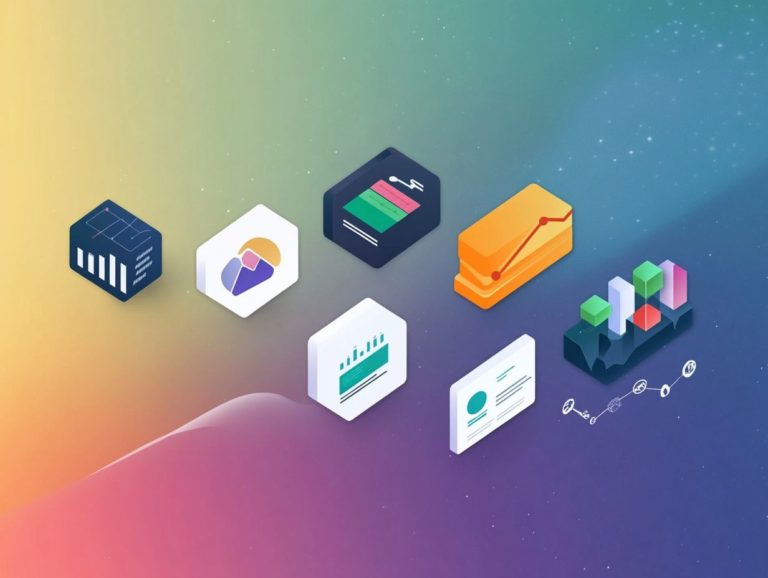SaaS for Startups: Key Considerations
In today s rapidly evolving digital landscape, you ll find that Software as a Service (SaaS) has become a game-changer for startups like yours. This model offers many benefits, including cost-effectiveness and scalability, making it the ideal choice for small businesses eager to expand.
This article delves into the definition of SaaS, its advantages for startups, and the key factors you should consider when selecting the right solution. It highlights essential features, provides a step-by-step implementation guide, and discusses the metrics you can use to measure success.
Whether you re just starting out or aiming to optimize your operations, this guide equips you with the insights needed to leverage SaaS effectively.
Contents
- Key Takeaways:
- What is SaaS?
- Why Use SaaS for Startups?
- Key Considerations for Choosing SaaS
- Must-Have Features for SaaS
- How to Implement SaaS for Your Startup
- Measuring Success with SaaS
- Frequently Asked Questions
- What is SaaS for startups and why is it important?
- What are the key considerations when choosing a SaaS for startups?
- Can SaaS for startups help with cost savings?
- How can SaaS for startups improve efficiency?
- Is data security a concern when using SaaS for startups?
- How can SaaS for startups support growth and scalability?
Key Takeaways:

SaaS provides a cost-effective and efficient solution for startups to access essential software tools and services without significant initial costs. When considering SaaS for your startup, be sure to prioritize factors such as scalability, security, and integration capabilities to ensure a successful implementation. To measure the success of your SaaS implementation, track metrics such as user adoption and ROI to continuously improve and optimize your usage of the platform.
What is SaaS?
SaaS, or Software as a Service, represents an advanced cloud computing model that gives you the power to access software applications seamlessly over the Internet.
This means you can say goodbye to the cumbersome processes of traditional software installation and maintenance. With this innovative approach, you can tap into a wide array of software solutions everything from project management to customer relationship management on a subscription basis, offering you unparalleled flexibility and scalability.
Startups and enterprises are drawn to the SaaS model. It not only fosters collaboration and enhances efficiency but also accelerates deployment timelines. Plus, it significantly trims down those initial costs, making it an attractive option for any forward-thinking business.
Definition and Benefits
The benefits of SaaS go well beyond mere convenience, presenting you with substantial advantages like increased efficiency, improved customer engagement, and a higher return on investment (ROI) for your business.
With its subscription-based model, SaaS gives both startups and established organizations the ability to significantly cut down on initial capital expenditures, resulting in noteworthy cost savings. This financial flexibility allows you to allocate resources more strategically and invest in other critical areas that drive growth.
The scalability of SaaS solutions means they can effortlessly expand alongside your business, adapting to fluctuating demands without requiring extensive infrastructure changes. Plus, the enhanced security features built into these platforms safeguard sensitive data, providing you with peace of mind as a business owner.
Together, these elements work in harmony to elevate productivity, boost customer satisfaction, and ultimately enhance your operational efficiency.
Why Use SaaS for Startups?
Startups can experience a game-changing transformation by using SaaS applications! These cloud-based solutions offer substantial benefits that elevate operational efficiency and foster rapid growth in today s fiercely competitive environment.
By utilizing SaaS, you can automate a range of processes from financial management to e-commerce while accessing vital market research tools without the cumbersome overhead tied to traditional software installations.
Not only does this model cut costs, but it also gives you the flexibility to grow, allowing your business to swiftly adapt to evolving market trends and customer needs.
Advantages for Small Businesses
Small businesses can harness the power of SaaS to streamline operations, enhance collaboration, and elevate customer support, leading to increased productivity and growth.
By using these platforms, you gain access to intuitive tools that facilitate real-time collaboration among remote teams. Solutions like Slack and Trello serve as effective task management systems, allowing you and your team members to organize projects effortlessly, assign tasks, and track progress all in one centralized location.
The customer support features offered by SaaS applications, such as Zendesk, empower your business to respond promptly to client concerns, ensuring satisfaction and fostering loyalty.
These resources help you save time and focus on your core business, driving success through technology that scales with your evolving needs.
Key Considerations for Choosing SaaS

When selecting a SaaS solution, consider these crucial factors: network security, customization options, and the overall subscription fee.
This careful consideration ensures that the software you choose aligns with your operational needs and fits within your budget.
Factors to Keep in Mind
When evaluating different SaaS offerings, key factors should guide your decision-making process, including:
- Network security protocols
- Performance tracking capabilities
- Scalability to accommodate your growth
Understanding these elements is essential for safeguarding sensitive information, ensuring optimal functionality, and laying a solid foundation for future expansion.
For instance, robust network security measures like end-to-end encryption and multi-factor authentication are vital in protecting client data from unauthorized access.
Performance tracking is another critical aspect; it enables you to measure ROI by analyzing metrics like user engagement and system uptime, providing insights that can drive your strategic decisions.
Scalability is equally important; you want platforms that can seamlessly adapt to increasing demands, whether through enhanced storage options or the ability to integrate new applications.
Consider leading solutions like Salesforce, which evolve alongside your business needs.
Must-Have Features for SaaS
To fully harness the advantages of SaaS, seek out key features like:
- Data visualization
- Marketing automation
- Efficient workflow management
These capabilities can significantly elevate your productivity and refine your decision-making processes, positioning your startup for success.
Essential Tools for Startups
For your startup, essential SaaS tools encompass:
- Project management systems
- Customer relationship management (CRM) platforms
- Online learning resources
These tools can dramatically boost your overall productivity, enabling your team to manage tasks more efficiently and ensuring smooth communication.
With project management systems, you can track deadlines, assign responsibilities, and visualize progress, cultivating a sense of accountability across the board.
On the CRM front, these platforms enhance customer relationships by centralizing client information, streamlining communication, and allowing for a more personalized service approach.
Meanwhile, online learning resources empower employees to continuously hone new skills, nurturing a culture of growth and adaptability in today s fast-paced marketplace.
By using these SaaS solutions, you can navigate challenges more effectively and scale your operations with confidence and ease.
How to Implement SaaS for Your Startup
Implementing SaaS for your startup requires a thoughtfully structured approach. This means engaging in careful planning, ensuring the software is installed correctly, and fostering real-time communication among your team.
By doing so, you can achieve seamless integration and maximize the effectiveness of the tools at your disposal.
Start your journey today by exploring SaaS tools that can transform your business!
Step-by-Step Guide

Implementing SaaS within your startup requires a systematic approach that addresses key aspects such as employee management, workflow management, and customization tailored to your specific needs.
- Start by conducting a thorough assessment of your current processes to pinpoint areas ripe for improvement. This creates a tailored strategy that aligns software features with your organizational requirements.
- Next, you ll initiate the onboarding phase, engaging key stakeholders to foster buy-in and facilitate a smoother adoption process.
- Customization is critical at this stage, ensuring the software is configured to fit your startup s unique workflows seamlessly.
- Don t overlook employee training; comprehensive sessions are essential for enhancing user engagement and proficiency, leading to a smoother transition.
- Continuously evaluate the software s impact to adapt features as your business evolves, ultimately maximizing efficiency and productivity.
Measuring Success with SaaS
Measuring success with SaaS requires you to analyze a range of metrics that illuminate performance tracking, lead generation effectiveness, and sticking to budget goals.
This process gives useful insights into how well the business runs and empowers you to make informed decisions that drive growth and improvement.
Metrics to Track and Analyze
In a SaaS environment, it s crucial for you to track and analyze key metrics such as performance tracking indicators, customer acquisition cost (CAC), and insights into emerging market trends that could shape your business strategies.
Understanding CAC, or the total money spent to gain a new customer, is vital for assessing the efficiency of your marketing efforts. By comparing CAC with customer lifetime value (CLV), you can evaluate your profitability and optimize your spending on customer outreach initiatives.
Utilizing performance tracking indicators like monthly recurring revenue (MRR) and churn rate provides invaluable insights into subscription health, enabling you to pinpoint areas that need improvement.
Keeping an eye on emerging market trends allows you to pivot swiftly in response to changing demands, ensuring that you remain competitive and continue to innovate effectively.
Frequently Asked Questions
What is SaaS for startups and why is it important?
SaaS (Software as a Service) for startups refers to the use of cloud-based software solutions to help startup businesses manage various aspects of their operations. It is important for startups because it offers affordable, scalable, and accessible tools that can help them save time and resources, increase efficiency, and remain competitive in their industry.
What are the key considerations when choosing a SaaS for startups?

- Cost and pricing structure
- Customization and integration capabilities
- Data security and privacy
- Scalability
- User-friendliness
- Customer support
It is important for startups to carefully evaluate these factors to ensure they select the right SaaS solution for their business needs.
Can SaaS for startups help with cost savings?
Yes, SaaS for startups can help with cost savings in several ways. Firstly, it eliminates the need for expensive upfront investments in hardware and software. Secondly, it offers a subscription-based model, where startups only pay for the features and services they need. Thirdly, it reduces IT maintenance and support costs as these are typically handled by the SaaS provider.
How can SaaS for startups improve efficiency?
SaaS for startups can improve efficiency in various ways. It offers easy and quick access to business tools and data from anywhere with an internet connection. It also automates manual tasks and processes, allowing startups to focus on more important tasks.
Additionally, SaaS solutions often have user-friendly interfaces and provide real-time updates and analytics, enabling startups to make informed decisions and stay ahead of the competition.
Is data security a concern when using SaaS for startups?
Yes, data security is a significant concern for startups using SaaS. Storing sensitive information on a third-party platform can be risky.
Startups must check the security measures and certifications of the SaaS provider before making a choice. Implementing robust data backup and disaster recovery plans is essential to guard against data theft or loss.
How can SaaS for startups support growth and scalability?
SaaS can help startups grow by offering flexible solutions that adapt to their changing needs. As businesses expand, they can easily add or remove features, users, and storage space.
This flexibility saves startups from constant hardware and software updates. It allows them to scale efficiently and cost-effectively.





